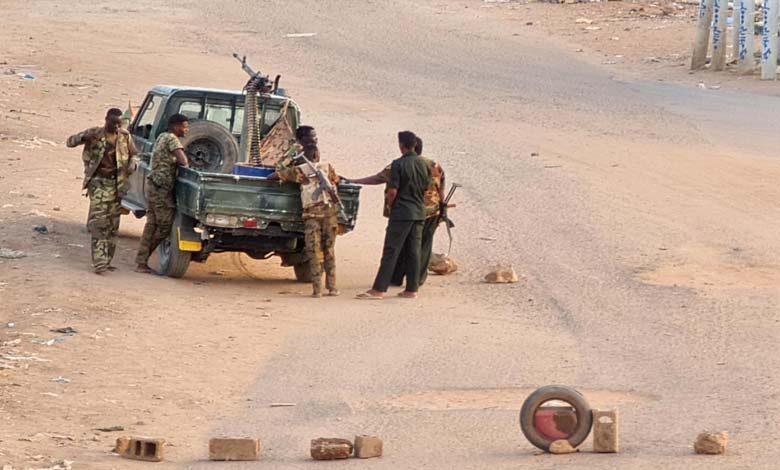Continuous Clashes in Sudan… Have Jeddah Negotiations Failed?

Jeddah in Saudi Arabia witnessed an agreement for a ceasefire between the conflicting parties—the Sudanese army and the Rapid Support Forces—mediated by Saudi-American efforts. The agreement was set to last a week to facilitate the delivery of urgent humanitarian aid and restore essential services.
American magazine Foreign Policy noted the violation of the ceasefire agreement after reports of sporadic gunfire and fighter jets flying over civilian homes, indicating this is not the first time that a breach of the cessation of hostilities agreement between the army and the Rapid Support Forces has occurred.
Nevertheless, many experts, analysts, and international officials harbor high hopes for the success of the recent ceasefire that went into effect last Monday after formal negotiations and a deal brokered by the United States and Saudi Arabia.
Clashes, Looting, and Rape
The clashes began in Khartoum between the Sudanese army led by Lieutenant General Abdel Fattah al-Burhan and the Rapid Support Forces, led by its deputy, Mohamed Hamdan Dagalo, known as “Hemedti,” in mid-April of last year.
According to Foreign Policy, the war has caused extensive damage to the capital, Khartoum, with significant destruction to vital city infrastructure. The ongoing fighting between the two armies has occurred close to densely populated residential areas.
As a result, food and medical supplies have rapidly dwindled. Reports emerged of widespread looting in banks, warehouses, and civilian homes.
Over a million people have fled their homes, and over 700 individuals have been reported killed, according to the World Health Organization.
Amidst continuous aerial bombardments, many citizens have sought refuge inside their homes, with diminishing access to water and electricity.
The magazine quoted residents who described hearing artillery fire in areas of the Sudanese capital, with warplanes flying overhead. Despite this, the monitored ceasefire, under international observation, has brought relative calm after intense battles.
Activists speaking to the American magazine complained of severe human rights violations against civilians, and they called for the United Nations to open an investigation.
Foreign Policy noted that despite previous violations during periods preceding ceasefires, this is the first official ceasefire resulting from negotiations between the conflicting parties. It highlighted that while there were some breaches in the early hours of the truce, it might endure longer than its predecessors.
The agreement includes a monitoring mechanism involving the army and the Rapid Support Forces, in addition to representatives from Saudi Arabia and the United States, who mediated the agreement following talks in Jeddah.
The U.S. Secretary of State, Antony Blinken, stated that the monitoring mechanism would be conducted “remotely,” adding, “If the ceasefire is violated, we will know and hold the violators accountable through our sanctions and other available means.”
On Tuesday, the U.S. administration announced $245 million in humanitarian aid for Sudan and its neighbors.
In their first comment on the recent breaches of the ceasefire agreement, Saudi Arabia and the United States reaffirmed the importance of the ceasefire agreement and humanitarian arrangements in Sudan.
The Saudi Foreign Ministry emphasized in a statement that the Sudanese parties had not yet committed to refraining from seeking military gains on the ground. It stressed that Riyadh and Washington demanded both sides to commit to the ceasefire. The mediators reported violations of the ceasefire, including attacks in Khartoum and El-Obeid, located in the center of North Kordofan state, as well as airstrikes and weapon exploitation.
It stressed the urgent need for humanitarian aid for the Sudanese people and the restoration of basic services, which would be possible under the temporary ceasefire, provided both conflicting parties abide by it.
It further stated, “Given the ongoing suffering of the Sudanese people due to this devastating conflict, the Kingdom and the United States renew their commitment to the Sudanese people and demand that the conflicting parties adhere to their commitments to the temporary ceasefire to provide the necessary humanitarian aid.”
Refugees
Regarding some reasons that may hinder the continuation of the new ceasefire and lead to its failure, Foreign Policy pointed out that even before the outbreak of the recent fighting, Sudan was one of the world’s largest host countries for refugees, with most of them coming from South Sudan.
US President Joe Biden signed an executive order authorizing the government to impose sanctions on individuals and entities involved in the conflict.
However, security experts interviewed by the American magazine believe that without the consent of regional actors, these sanctions will not be effective in achieving a long-term ceasefire.
A Haven for Terrorism
Foreign Policy also pointed out that when violence erupted in Sudan in mid-April, Blinken expressed concern that the power struggle would undermine “efforts to restore the democratic transition in Sudan,” and asked, “Will Saudi mediation succeed in addressing Blinken’s concerns about democracy?”
They answered, “The unfortunate reality is that there are no democrats or peacemakers in Sudan. Since gaining independence in 1956, Sudan has suffered from absolute rule and civil wars, and while it is still recovering from the dictatorship led by Omar al-Bashir, it remains divided between armed leaders, each seeking control of the country.”
Regarding the possibility of the ceasefire agreement failing, the American magazine pointed out that the risks at that point would be significant, warning that Sudan is on the verge of becoming another Libya.
They noted that the war in Sudan will not only harm the regional economy but also signal a return of Sudan as a haven for terrorists. They added, “From there, these terrorists can undermine efforts to enhance stability in the Sahel region, in addition to threatening the stability of more distant areas.”
The American magazine also reminded that Al-Qaeda leader Oussama bin Laden had spent five years in Sudan, working to develop the terrorist group’s capabilities before carrying out the September 11 attacks in the United States.












